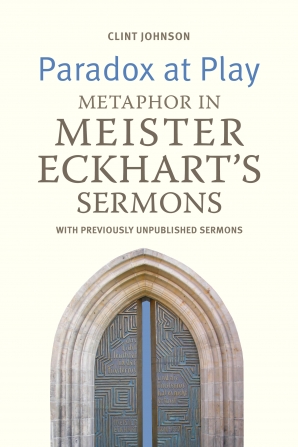Preparing your PDF for download...
There was a problem with your download, please contact the server administrator.
Paradox at Play
Metaphor in Meister Eckhart's Sermons: with Previously Unpublished Sermons
Imprint: Catholic University of America Press
Fresh translations of Meister Eckhart’s sermons are made available in this volume: three for the first time in English and sixteen others for the first time since C. de B. Evans translated them in 1924 and 1931, long before the critical editions of the manuscripts were published in 2003. Other important sermons are included in the translations as well. They improve upon previous translations which were not as sensitive to Eckhart’s metaphorical repertoire and his subtle word choice and phrasing.
The extended introductory essay describes Eckhart’s metaphors and how they work together to form a cohesive whole. By looking at what his metaphors tell us about what an individual person is and how the view of the individual changed in the late medieval world, his ostensibly shocking rhetoric (in places where it is actually novel) is shown to be indicative of a larger cultural tide that culminated in the modern worldview. Finally, all of his homiletic choices are shown to be in service of the greater goal: catalyzing transformative change in his audience by stubbornly insisting on his paradoxes and jarring people out of their customary way of relating to God and themselves.
Clint Johnson teaches philosophy at the Georgia Institute of Technology, where he is a Principal Research Scientist. He is also a Part-time Assistant Professor of philosophy at Kennesaw State University and Instructor of philosophy at Florida State University. Meister Eckhart (c. 1260 - c. 1328) was a German theologian, philosopher and mystic.
"In giving these sermons new translations made by someone up to date on Eckhart scholarship, the volume will do a real service to English-language readers and scholars of Eckhart."
~Bruce Milem, author of The Unspoken Word: Negative Theology in Meister Eckhart's German Sermon (CUA Press)
"In each generation the richness of the work of Meister Eckhart needs to be thought through again in ways that preserve its freshness. Eckhart holds what is perhaps a unique position in Western religious thinking since his way of speaking about divinity, through his many sermons, aligns him with modes of thinking and feeling which can seem to be as much Eastern as they are Western. The present generation of scholars needs to be concerned with the potentially unique contribution that Eckhart’s work can make in an ever smaller world. Clint Johnson’s careful and nuanced reading of Eckhart’s sermons, and his passion for engagement and understanding of these extraordinary works, is surely a vital element in humanity’s slow advance to planetary unity."
~Oliver Davies, King’s College London
"Clint Johnson has written an important book on Meister Eckhart. The focus is on the central role of metaphor in Eckhart’s sermons. The new translations of heretofore untranslated sermons and re-translations of sermons done prior to the Critical Edition render a great service to Eckhart scholarship. They challenge the reader to appreciate the power of Eckhart’s skillful rhetoric. While using the theory of metaphor of Hans Blumenburg to situate Eckhart between medieval and modern thought, Johnson ensures that the reader will remain focused on Meister Eckhart’s own uses of metaphor. An understanding of the play of metaphor and paradox is shown to be a prerequisite for a good understanding of Eckhart’s sermons."
~Jeremiah Hackett, University of South Carolina

